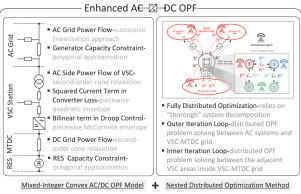Enhanced AC/DC optimal power flow via nested distributed optimization for AC/VSC-MTDC hybrid power systems
IF 5
2区 工程技术
Q1 ENGINEERING, ELECTRICAL & ELECTRONIC
International Journal of Electrical Power & Energy Systems
Pub Date : 2024-11-30
DOI:10.1016/j.ijepes.2024.110365
引用次数: 0
Abstract
The deployment of voltage source converters (VSC) to facilitate flexible interconnections between the AC grid, renewable energy system (RES) and Multi-terminal DC (MTDC) grid is on the rise. However, significant challenges exist in exploiting coordinated operations for such AC/VSC-MTDC hybrid power systems. One of the most critical issues is how to achieve the optimal operation of such wide-area systems involving several power entities with as minimal communication burden as possible. To address this issue, an enhanced AC/DC optimal power flow (OPF) is specifically proposed. Firstly, a mixed-integer convex AC/DC OPF model is explicitly formulated to describe the optimal operation of such hybrid power systems. Subsequently, a nested distributed optimization method with double iteration loops is developed to offer optimal system-wide decision-making through a more “thorough” distributed communication architecture. In the outer iteration, the original AC/DC OPF problem is decomposed into several slave problems (SPs) associated with systems (including the AC grid and RESs) and one master problem (MP) associated with the integrated VSC-MTDC grid. Generalized Benders decomposition (GBD) serves to solve the master and slave problems iteratively. Techniques such as multi-cut generation and asynchronous updating are utilized to upgrade the GBD performance of computation efficiency and address communication delays. In the inner iteration, the master problem is continuously decomposed into multiple sub-MPs associated with individual VSCs. The alternating direction method of multipliers (ADMM) is employed to solve these sub-MPs iteratively. Proximal terms and heuristic approaches are embedded to enable parallel computation and handling of integer variables. Numerical experiment results finally validate the effectiveness of the proposed enhanced AC/DC OPF. The constructed AC/DC OPF model exhibits acceptable accuracy in terms of power flow calculation, and the developed nested distributed optimization method showcases decent convergence rate and solution optimality performances.

求助全文
约1分钟内获得全文
求助全文
来源期刊
CiteScore
12.10
自引率
17.30%
发文量
1022
审稿时长
51 days
期刊介绍:
The journal covers theoretical developments in electrical power and energy systems and their applications. The coverage embraces: generation and network planning; reliability; long and short term operation; expert systems; neural networks; object oriented systems; system control centres; database and information systems; stock and parameter estimation; system security and adequacy; network theory, modelling and computation; small and large system dynamics; dynamic model identification; on-line control including load and switching control; protection; distribution systems; energy economics; impact of non-conventional systems; and man-machine interfaces.
As well as original research papers, the journal publishes short contributions, book reviews and conference reports. All papers are peer-reviewed by at least two referees.

 求助内容:
求助内容: 应助结果提醒方式:
应助结果提醒方式:


